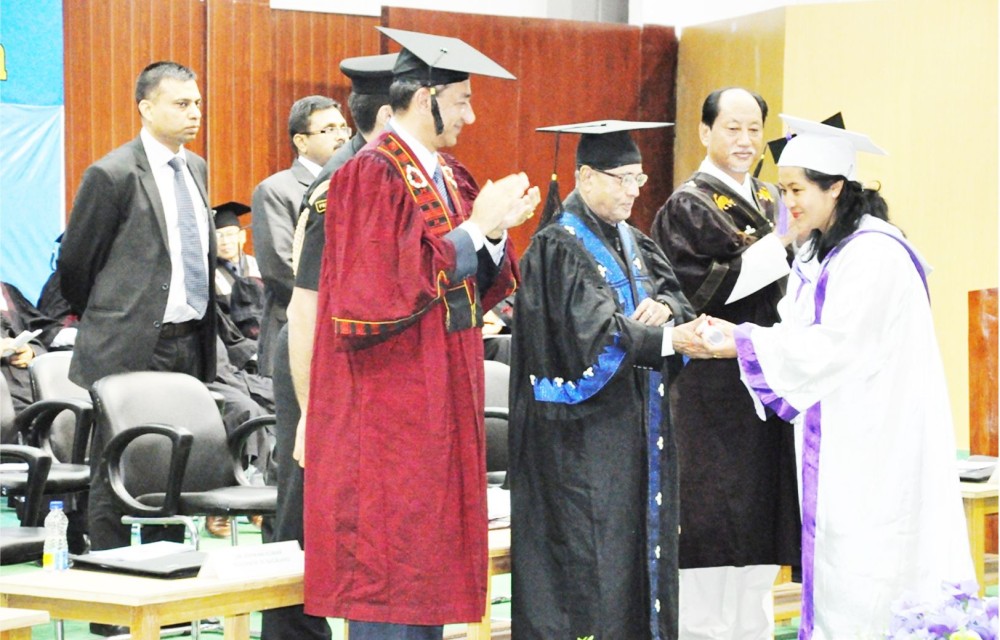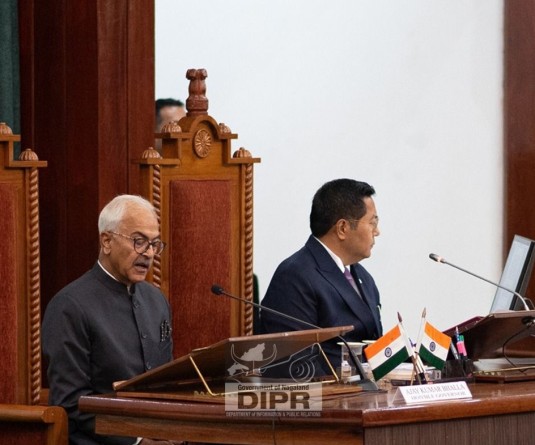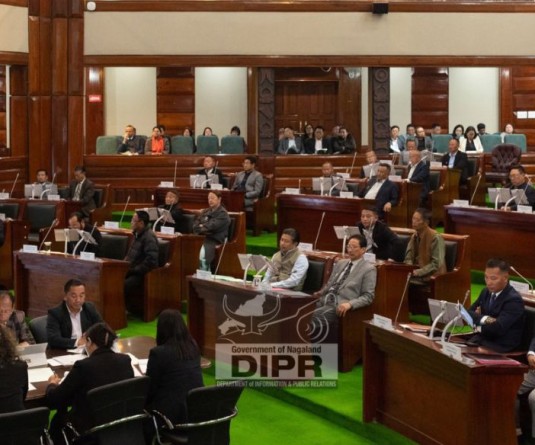President, Pranab Mukherjee handing a PhD award to one of the successful candidates during the 3rd Nagaland University Convocation at Lumami on May 15.

Our Correspondent
Lumami | May 15
The President of India, Pranab Mukherjee today lamented that India is deficient in the number of quality academic institutions and that the problem of quantity and quality still persists in the Indian education system. The President, who was the chief guest at the Third Convocation of Nagaland University at its Headquarters at Lumami (Zunheboto district), said that the higher education system in India rests on the three pillars of quality, affordability and accessibility. At the end of the Eleventh Year Plan period, there were a total of 659 degree awarding institutions and over 33,000 colleges.
During this plan period, 65 new central institutions, including 21 central universities were established and now, except for one state, there is at least one central university in every state in the country. However, the problems of quantity and quality still persist, said Mukherjee. “We are deficient in the number of quality academic institutions, on account of which, many bright students go abroad for higher studies,” he said while adding that there are more than two lakh Indian students studying abroad. While lamenting that not a single Indian University figures in the list of the top 200 universities in the world, Mukherjee reminded, that there was a time when India had world class universities like Nalanda and Takshashila, which attracted scholars from all over the world.
“We can revive our lost glory. We have the capability to take at least a few of our academic institutions to a global top league,” the President challenged. However, Mukherjee maintained that the way education is being imparted in higher educational institutions should be changed.
“A culture of excellence should be embedded in our thought process. Every university should identify one department that can be developed into a centre of excellence. I call upon the Central Universities to take the lead in this transformation,” the President said. While pointing out that India’s higher education system is the second largest in the world, Mukherjee lamented enrolment rate for the 18-34 years age group in India is only 7 percent, compared to 21 percent in Germany and 34 percent in the US.
“This effectively denies many good students the opportunity to acquire higher education. We have to increase accessibility in higher education as a means to achieve greater inclusion,” Mukherjee pointed.
In this connection he suggested that innovative teaching methodologies should be adopted by the Indian universities by increasing the use of technology. He maintained that the infrastructure of the National Mission on Education through Information and Communication Technology has great potential to facilitate collaborative information sharing. Asserting that the success of inclusion in higher education also depends on affordability, Mukherjee advised that meritorious students from difficult socio-economic background should be assisted to pursue higher education through scholarships, student loans and self-help schemes.
He also listed the shortage of faculty as a factor that has hampered efforts at improving the standard of education in the country. He said the vacancy of faculty at central universities stands at 38 percent; immediate steps should be taken to fill up these vacancies. He suggested resorting to ‘technology solutions’ such as e-classrooms to tide over this shortage of faculty crisis. Nonetheless, the President challenged that teachers must possess latest information and knowledge so that they can give their students the best education. He stressed on the need for ‘inspired teachers’ who can shape thoughts of the young mind and by their courage of conviction, deep knowledge of the subject and extraordinary communication ability assist the students in understanding and appreciating a subject from a wider perspective and encourage them to question their own knowledge.
“Inspired teachers also instill in their students correct values which are necessary for the growth and advancement of our nation. Our education institutions must recognize such inspired teachers. They should be encouraged to create a wider network of such educators to share their knowledge wisdom and philosophy with larger number of students,” the President said.






